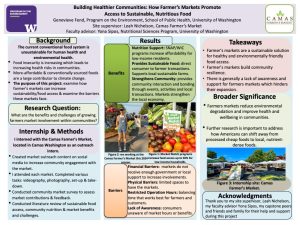Assessing Involvements of Farmer’s Markets in Communities
There is an increasing rate of food disparities, food related illnesses including obesity, heart disease, diabetes and lack of access to healthy and affordable food in communities. Supermarkets tend to be filled with lower quality produce and lots of processed foods that are created unsustainably. Conventional agriculture accounts for a significant contribution to environmental degradation and climate change. Farmers markets are an enriching way for us to sustainably access food within our communities. Farmers markets supply sustainable, nutrient dense and wholesome foods that you cannot access at supermarkets. These markets are critical in increasing sustainable food access, decreasing the rate of food related health implications and finally providing the opportunity to strengthen communities. I researched how farmers markets could further increase their involvement in communities and what are the common barriers that prevent them from doing so? I interned for the Camas Farmers Market by working as an outreach assistant to promote the market on social media in an attempt to attract more customers and community support. Besides working on the site, I completed my own research of literature about common benefits and challenges farmers markets experience. In my project I found that markets do not receive enough local and government support to expand despite how beneficial they are. As they improve well-being and health to the customers they serve. Even though they are of smaller significance now, I see that farmers markets will become a key strategy to increase community resilience in the future.
